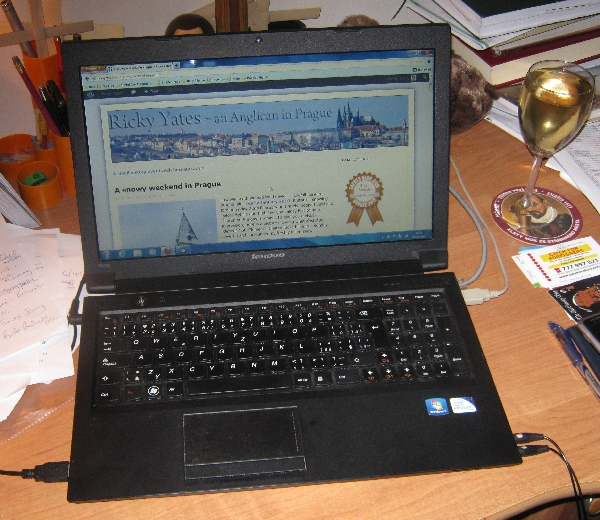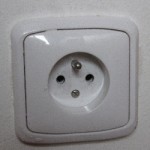
Two weeks ago yesterday, Sybille and I made a short journey in our car, to a Prague City Council facility where it is possible to safely and legally dispose of electrical and other household goods that any Prague resident no longer requires. In the boot of my car, were four – yes four 😀 , old computers, together with a screen monitor, all of which had been rapidly gathering dust for many months, sitting on the floor of my office in the Chaplaincy Flat. Prior to that, two of the computers had been stored in the bottom of the wardrobe of our guest bedroom for at least couple of years.
Before disposing of the computers, Sybille spent several hours completely clearing each of them of all the data they once held, so that no confidential information could end up in wrong hands. It was waiting for Sybille to find the time and this programme to do this, that had delayed their disposal. One thing that particularly struck me as we carried out this whole exercise, was how rapidly technology advances and changes these days. How what was once state-of-the-art technology, has so soon becomes obsolete.
The other question you may well be asking is how on earth we came to possess so many computers in the first place! Well there are explanations, including the important fact that all of them were given to us, second or third hand. We never paid a penny/cent/halér for any of them!
Two of them belonged to Sybille and came with us when we moved to the Czech Republic in September 2008. Both had Windows 98 as their operating system and the facility for inserting a floppy disk. I wonder how many of my readers remember them? 🙂 One of the two when bought new, was the office computer for the group of parishes in North Oxfordshire of which I was Rector from January 1993 until August 2008. It was bought to replace its predecessor which used the DOS operating system. How many readers remember that?
When the Benefice Council agreed to buying a new computer that had Windows XP as its operating system, they also agreed that Sybille could have its predecessor. She inherited the second computer from a husband & wife who lived within that group of parishes and who ran their own business from home and were also upgrading their computer systems.
The other two computers had both been the Prague Chaplaincy Computer in times past. One of them was the computer I inherited when we moved to Prague in September 2008. It had Windows 2000/NT as its operating system and was apparently given to my predecessor as Chaplain, by an American member of the congregation who was returning to the USA and did not wish to take it back with her. It was the computer on which the early posts and associated photographs for this blog were compiled. But by Spring 2010, it was rapidly dying.
The second computer replaced the first. It was given to me by a current member of the congregation whose employers had recently upgraded their computers, and were happy for the old ones to go to voluntary organisations who could make good use of them. It was a vast improvement on the Windows 2000/NT model as it had Windows XP as its operating system. But having previously belonged to a Czech company, it had one major downside – it only spoke to me in Czech 🙁
Despite this, it served me well for just under two years. That was until the on-board battery died, which nearly resulted in me losing all of my data and files. Fortunately, my computer savvy wife came to the rescue, but that incident made it imperative that I moved to another computer as soon as possible. Fortunately, a generous donation and a contribution from Sybille and myself, enabled the purchase of the new laptop computer I’m currently using to compile this post, as I explained in an earlier post of late May 2012 entitled ‘All change!‘
I greatly appreciate the freedom that my laptop computer now gives me to remain connected via email and the internet, when I am travelling. Whilst it normally sits on my desk in the office of the Chaplaincy Flat, connected to mains power and to our home wifi network, I have taken it with me to Brno, when staying there overnight after conducting a service, and also when I visited the UK in August last year. To be able to access my email & answer any urgent enquiries when not residing at home, is a great boon.
Yet when I see people out and about with their tablet computers, iPhones, etc., I am left to wonder as to how quickly my laptop computer, which is still less than one year old, will be considered as being obsolete. After all, its operating system is Windows 7, which has already been succeeded by Windows 8. There are times when I think, can we not stop for a moment and actually appreciate all that modern technology has done for us? Instead, technology continues to advance – and that advance seems to become ever more rapid.




Hello Ricky!
This is a very true article and I could not agree more with you. Technology does advance ever more rapidly. This is in part because the technology we use to design new technology also becomes more advanced as technology as such advances faster. I know this sounds like double talk, but here is one example: Computer processors. The design of their extremely sophisticated semiconductor structures is a genuine pain in the neck, to put it mildly. It needs powerful computer hard and software to do, so the more advanced computers get, the more advanced these processor designs can be made (and also, more rapidly). So, yes, there is a positive feedback loop at work here. Period.
One other thing technology does (and I know, working at an electronics company, it is my bread and butter) is accelerate our own lives by giving us all these lovely “tools” which allow us to do more work in less time. One example is E-mail, of course. The next one is BlackBerry, which made emailing possible while on the go (as opposed to only at ones desk). Now here we go with voice control software such as Apples Siri, which allows us to do those things while driving (!).
I came to think about these things because we have a computer at work running Windows 3.11, which we cannot yet make obsolete. But seeing this lovely, minimalist user interface made me wonder. “What if computers and technology in general wouldn’t advance so rapidly. What if technology would evolve a little slower, so that the technology from 20 years ago or so, would be cutting edge today?” would we be worse off in our daily lives? Probably not! In fact, I think our lives would be just a little more relaxed and we would be a little more happy because there were one less thing to keep running after.
End of speech. But this is a very complex issue and I have spent whole days thinking about it in detail.
Hello Benedikt!
Thank you for this most informative & interesting comment. Your explanation as to how technology advances because it is effectively self-perpetuating, is quite enlightening.
Whilst these lovely ‘tools’ do allow us to accomplish more work in less time, they also add to what I often call our ‘instant society’. The expectation that an email or text message will always get an instant reply. Sometimes email can become a tyranny that governs our lives 🙁
Finally, I concur entirely with all the sentiments you express in your third paragraph. Like you, I often wish that technology did not advance so rapidly. Yes, our lives would be that little more relaxed 🙂
About a year ago, there was a report on the issue how time becomes more and more compressed on the excellent German radio station “Bayern 2”. I downloaded it to my phone back then, I’d be happy to share it with you (it’s in German, of course). Just let me know.
On the flight from Beijing back to Munich, I watched a video on the planes on-board entertainment system, exploring the same issue. And – believe it or not – there is actually a small country, somewhere between India and China, where they don’t measure ‘gross national product’ as the key indicator of the health of their economy. Instead, they measure ‘gross national happiness’ and make a fuss about it when it rises, much like we do with economic growth. If the impression given by that documentary is accurate, I don’t think there is a more happy place to be on this planet.
I’m afraid Benedikt, that my German isn’t good enough to understand ein bayerisches Radioprogramm 🙁
Regarding your second paragraph, I think the country you are referring to is Bhutan. With regard to modern means of communication, the country has only had a TV service since 1999 🙂
Gosh, the chaplaincy flat will seem a lot more spacious now, Ricky. 🙂 My laptop is just under a year old and thankfully it came with Windows 7, as I really don’t fancy Windows 8. Actually, if I’m honest, I often think longingly of the sheer simplicity and ease of use of XP, which is what DH is still using. You’re right, technological advancement is happening at such breakneck speed that we hardly have time to get used to one product before it’s been superseded by something even faster and glossier.
My computer memories go back a long way, as DH was in on the very beginning of home computing back in the late 1970s. Not only do I remember floppy disks, but our first computer was an 8K Commodore Pet with a cassette drive!
http://perpetually-in-transit.blogspot.co.uk/2011/04/wheel-turns-full-circle.html
Yes Perpetua – I can now see more of the floor in my office 🙂
I’m very happy with my laptop, not least because, being new when I got it, I was able to ask it to speak to me in English, rather than Czech or Slovak which were to other possible options. I’m hoping it will last for the next few years so I don’t have to experience a new learning curve too soon!
Many thanks for the link to your April 2011 blogpost. My computer memories also go back to the late 1970s when I successfully wrote a simple program in FORTRAN to analyse data whilst I was at University in Lampeter, something I certainly couldn’t do now 😀
I really feel that – perhaps out of a desire to make more money – all the technology-related things are changing way too fast; way too fast for people to actually learn to use them!
I think I vaguely remember DOS. I was the first in my class to have a computer at home – which is funny, because with the fast-changing technologies of today, I’m on the old-fashioned side. I’m one of the people who do not have a laptop or tablet at school now, my home computer at school is about ten years old if not more, and I’ve only just got a new computer at home and the new one is about two years old actually…
BTW, Father switched to Linux (Ubuntu) recently with his laptop, and also his new computer in the works, and says that with all the hardware change going on (connecting a projector at work, for example) it’s much easier to use than Windows. In case one day all you had to go with was Windows 8, Linux seems to be a good option… I’m certainly sympathetic to the whole Open Source angle!
Hi Hana – I certainly think that a desire to make more money is part of it. However, it is difficult to stop technological progress, though you’re right in saying some things change too rapidly for people to be able to fully use them before more change happens.
Like you & your father, my wife is a great fan of Open Source programmes and refers to anything from Microsoft as ‘Microsucks’ 🙂
At one time, father used to blame everything (even things not computer-related) on “Gates” (pronounced the Czech way, in a derisive tone). 😀
I use Windows and Microsoft Office because unfortunately the respective Word processors are not always completely compatible and my school uses Microsoft. But if it were not for that annoying little thing, I think I’d switch as well…
I know what you mean Hana. Opening older documents, originally created in Microsoft Word, in ‘Open Office’, sometimes leads to one line going on to the next page which can be a particular problem for me with Orders of Service.
P.S. I’m still using the old Windows look on my Windows XP, too. 😀 Not a fan of the bright blue look… way too cluttered and aggressive on my eyes!
That’s harsh but true article about rapid development in technology and it makes me sad. Because I feel old in the face of speed of technology. I clearly remembered the days that I used windows 95 and little bit DOS 🙂 Playing Mario and writing something on Notepad was the entertaining experiments on Computer. Nowadays, everything can be controlled by touching only and in the near future, we are going to use eyes only to control electronic devices. It totally dazzles me!